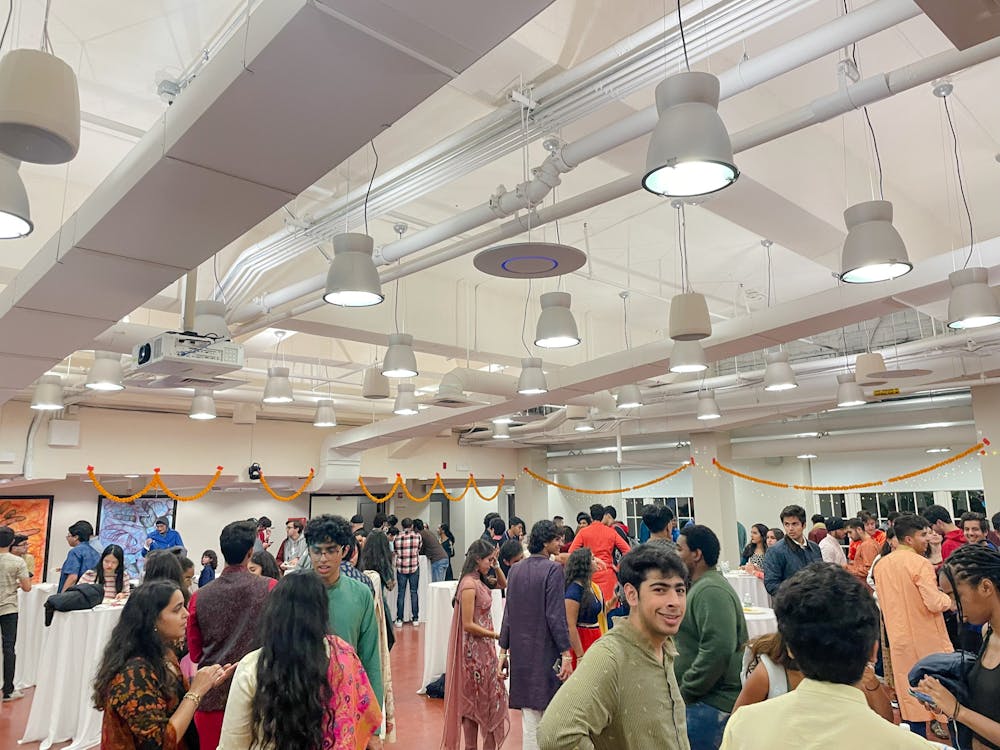Over 100 students crowded into the Kasper Multipurpose Room in the Stephen Robert ’62 Campus Center on Monday night to celebrate Diwali, a religious festival in Hinduism, Buddhism, Sikhism and Jainism.
Dressed in a variety of traditional South Asian clothing such as kurtas, lehengas and shararas, attendees began the celebration by mingling at tables placed throughout the room as Bollywood music played on speakers overhead.
Club leaders from a variety of student organizations introduced themselves at the start of the celebration, including members of the South Asian Students Association, Himalayan Cultural Association, Indian Students Association and Sikh Students Association. All four organizations worked together to plan Monday night’s celebration.
During their presentation on the history of Diwali, club leaders explained the ways in which the festival represents liberation from darkness, the victory of good over evil and an opportunity to wish for the protection of their families. Diwali also encourages the celebration of deities such as Sita, Rama and Vishnu.
For Vivek Rajani ’25, the Diwali festival also presented an opportunity for students with similar backgrounds to come together and celebrate.
“I’m surprised by the turnout. It’s good knowing that there are people who are ready to celebrate and feel so passionately about the community that we build together,” he said. “It’s just nice having that energy when we can’t be with our families and friends back home.”
Rachel Thomas ’25 echoed Rajani’s sentiment, similarly expressing her appreciation for the community.
“(Family) Weekend wrapped up, so it’s nice to have this community here. Bringing in the food and the music, and everyone wearing their Indian outfits, it’s just home,” Thomas said.
“Being Indian here and being able to go to one of these organizations or one of their events and just having that group of people here is very special,” she added. “Especially when you’re a freshman, it’s a nice way to find a community.”
When highlighting the importance of these organizations on campus, SASA President Oamiya Haque ’24, cited the inherent diversity among those who identify as South Asian and the importance of representation.
“SASA itself tries to cover such a diverse group of people. When we say South Asian people, we’re talking about multiple countries, multiple religions, and within those countries and religions, separate cultures,” she said.
“I think it’s great for representation because people see themselves in our e-board, in the events that we do and (in the) charities that we choose to partner with, especially if they came from communities where they didn’t see themselves represented,” Haque added.
Rajani and Thomas alike underscored how events like these can expand South Asian representation and provide insight into South Asian culture for those unfamiliar with it.
“I definitely think (it’s important), not only for people who are from that religion or background or who celebrate these festivities, but also for people who aren’t part of that,” Thomas said. “To come and be a part of it and see what it’s like, and be with friends and experience that is really special.”
Overall, Haque was pleased with the Diwali celebration’s success, citing the popularity of some of the activities featured at the event, including painting, card games and rangoli, an Indian art form that uses items like flower petals to create geometric designs.
Haque also expressed the significance of students’ cultures being expressed in a positive light.
“Celebrating our holidays is a form of resistance against the colonial powers that stopped us from practicing our culture in the first place,” Haque said.
“The fact that everybody is here celebrating the way that we were meant to celebrate, wearing the clothes that for so long we were made fun of for wearing, with a lot more pride than we did before is such a great sign that people are finding safe spaces and (can) practice what they (want) to practice,” she added.

Aniyah Nelson is a university news editor overseeing the undergraduate student life beat. She is a senior from Cleveland, OH concentrating in political science and sociology. In her free time, she enjoys listening to music and watching bloopers from The Office.





